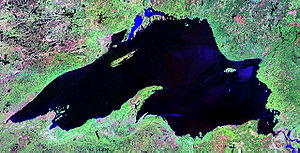Lake Superior: Difference between revisions
George Swan (talk | contribs) (first draft) |
George Swan (talk | contribs) (add image) |
||
| Line 1: | Line 1: | ||
[[File:Lake Superior NASA.jpg | thumb]] | |||
'''Lake Superior''' is the uppermost, deepest and largest of the [[North American Great Lakes]]. It is the largest both by volume and by surface area. The only freshwater lake that has a greater volume is [[Lake Baikal]], in [[Siberia]]. | '''Lake Superior''' is the uppermost, deepest and largest of the [[North American Great Lakes]]. It is the largest both by volume and by surface area. The only freshwater lake that has a greater volume is [[Lake Baikal]], in [[Siberia]]. | ||
Revision as of 20:34, 2 January 2024
Lake Superior is the uppermost, deepest and largest of the North American Great Lakes. It is the largest both by volume and by surface area. The only freshwater lake that has a greater volume is Lake Baikal, in Siberia.
It takes water over 200 years to transit the lake.
The name "Superior" is said to be due to a mistranslation. It is said that early French maps didn't actually name the lake, they merely described it as "superior", meaning uppermost, but English travellers, using the French maps, assumed that was its name.
The lake forms part of the boundary between Canada and the United States. Over 100 Lake freighters, and many "salties" use the lake to transport ore, grain, and construction materials like sand, gravel, limestone, and raw cement.
Thunder Bay, Ontario, on the northeast shore, is the railhead for Canadian railways.
Duluth, Minnesota, at the very western tip of the lake, is the most important port on the United States' side.
